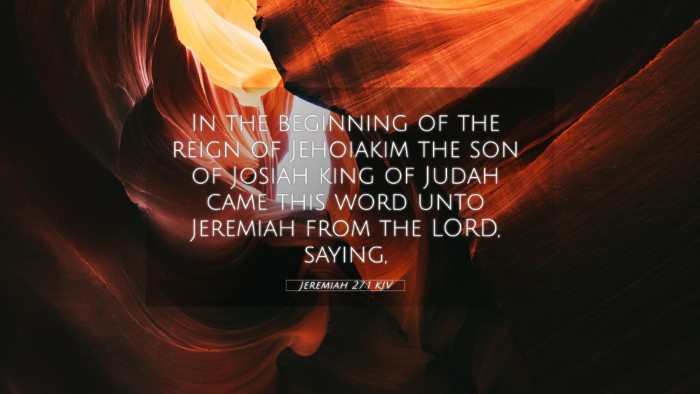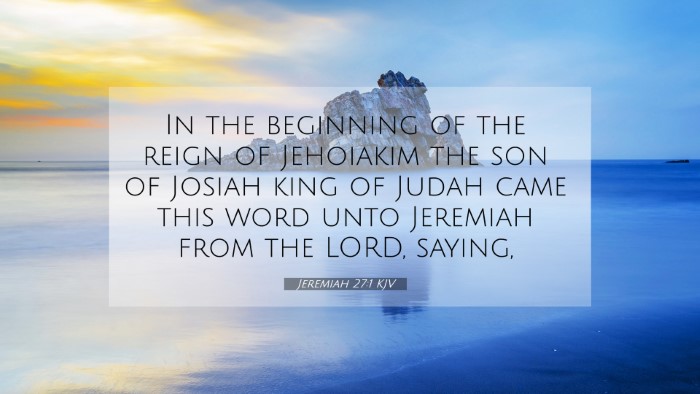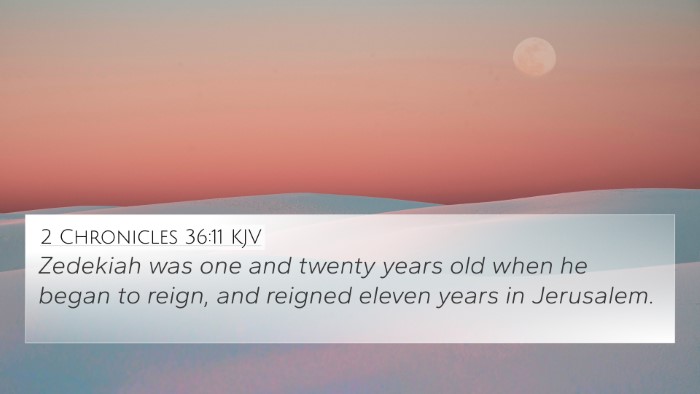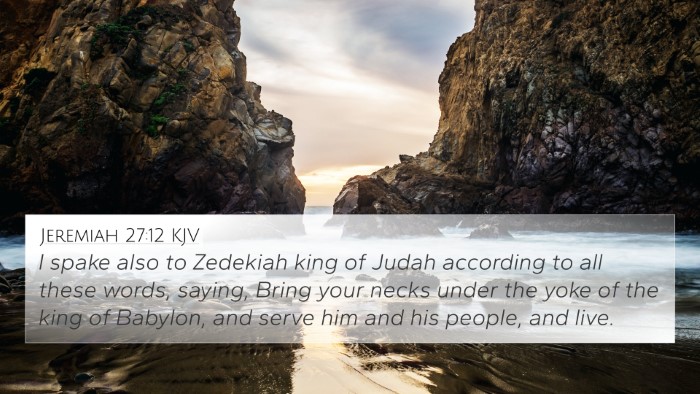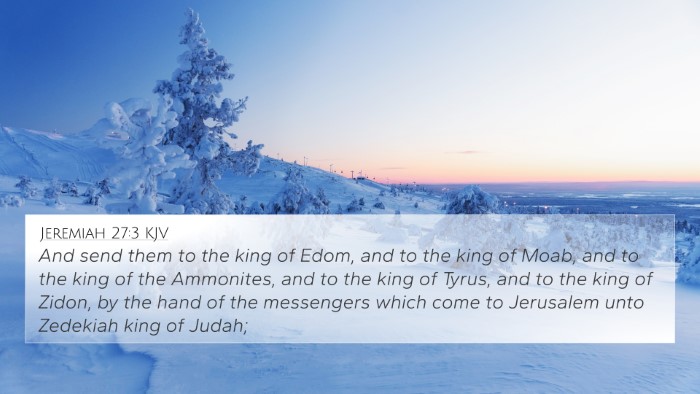Understanding Jeremiah 27:1
The verse Jeremiah 27:1 states, "In the beginning of the reign of Jehoiakim the son of Josiah king of Judah came this word unto Jeremiah from the Lord, saying." This opening sets the stage for the prophetic messages that follow and establishes the context of divine communication during a critical period in Israel's history.
Context and Significance
This verse marks the commencement of Jeremiah's prophecies under King Jehoiakim, highlighting the importance of timing in God's revelations. The king represents a pivotal point in Judah's history, as the nation faced impending judgment due to its idolatry and disobedience.
Commentary Insights
Matthew Henry's Commentary
Matthew Henry emphasizes the significance of the prophet's call and the importance of heeding God's words. He notes that the timing of God's message serves to remind the people of Judah that God is still in control despite their turmoil. The mention of Jehoiakim establishes a link between the prophetic messages and the ruling authority, illustrating that God's messages come in periods of both prosperity and decline.
Albert Barnes' Notes
Albert Barnes points out that this verse illustrates the personal nature of the prophetic process, where Jeremiah receives a direct word from God. He explains that this was during a time when Judah was prone to false prophets and leading the people astray, thus emphasizing the authenticity and authority of Jeremiah's messages. Barnes also highlights the structural aspect of Jeremiah's ministry, marking this initial verse as crucial for the unfolding of the narrative.
Adam Clarke's Commentary
Adam Clarke elaborates on the political climate of the time, noting that Jehoiakim's reign was characterized by instability, foreign threats, and moral decline. Clarke suggests that the word given to Jeremiah during this time serves as a wake-up call for the nation, calling them to repentance and awareness of their covenant responsibilities. He underscores the importance of this verse in connecting the personal aspect of Jeremiah's prophetic calling with the national crisis facing Judah.
Thematic Connections
This verse opens the door to various themes prevalent in the Book of Jeremiah and throughout the Bible. Below are seven critical cross-references that relate to Jeremiah 27:1:
- Jeremiah 1:4-10 - The calling of Jeremiah, establishing his role as a prophet.
- Isaiah 1:15-20 - A similar call to repentance and acknowledgment of sin.
- Lamentations 1:1-2 - Reflecting on the state of Judah post-judgment.
- 2 Chronicles 36:5-8 - A historical backdrop to Jehoiakim’s reign and its implications.
- Ezekiel 12:1-2 - Another prophetic warning during a time of strife.
- Matthew 23:37 - Jesus’ lament over Jerusalem, connecting to the prophetic heart of Jeremiah.
- Revelation 3:19 - The call to repentance and the necessity of correction in one's spiritual walk.
Exploring Connections Between Bible Verses
Understanding Jeremiah 27:1 through the lens of these cross-references unveils deeper insights about the continuity of God’s message throughout Scripture. The connections between Bible verses not only illuminate the messages of individual texts but also provide a comprehensive understanding of God's character and His relationship with His people.
Tools for Cross-Referencing Bible Verses
For those engaged in a Bible cross-reference study, several tools are invaluable:
- Bible Concordance: A comprehensive listing of Bible words and where they appear, useful for locating related texts.
- Bible Cross-Reference Guide: A resource that outlines thematic and structural links between verses.
- Bible Reference Resources: Tools allowing for easy navigation of verses and their interconnections.
- Cross-Referencing Bible Study Methods: Approaches that facilitate a deeper understanding of how scriptures dialogue with one another.
- Bible Chain References: A structured way of following topics through various scriptures.
Applications for Sermons and Study
Pastors and educators may find the exploration of Jeremiah 27:1 particularly helpful in sermon preparation, as it provides not only a prophetic message but also a framework for discussing themes of authority, repentance, and divine communication. The cross-references can serve as a foundation for detailed studies on the role of prophets, the importance of leadership in spiritual contexts, and the nature of God's call.
Conclusion
In conclusion, Jeremiah 27:1 sets a significant tone for understanding the prophet's mission and the historical context of his messages. By establishing connections with various scriptures, the text reveals the timeless nature of God's word and the importance of prophetic voices across generations. Engaging in comparative Bible verse analysis and utilizing cross-reference tools can enhance one's study and reflection on such pivotal scriptural moments.

